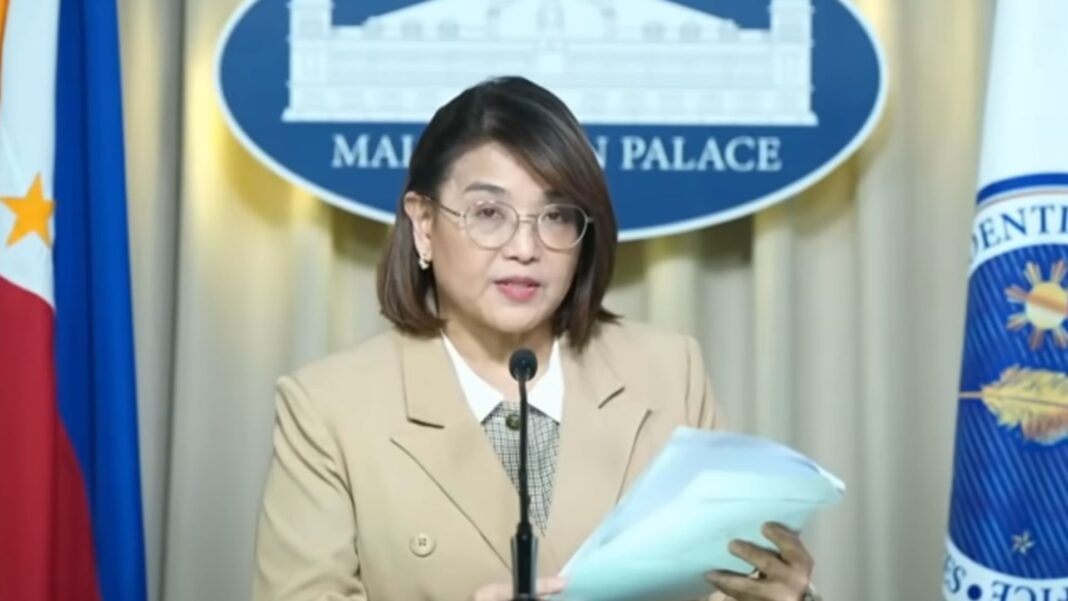The announcement came swiftly and without warning. Late Monday afternoon, Malacañang called an unscheduled press briefing, prompting reporters to rush into the small, unassuming room often used for routine updates. This time, however, the tension was unmistakable. When Palace press officer Undersecretary Claire Castro stepped forward, her message signaled the most consequential Cabinet shake-up of the Marcos presidency: Executive Secretary Lucas Bersamin and Budget Secretary Amenah Pangandaman had resigned.
For months, rumors about Bersamin’s future circulated inside political circles, surfacing every time whispers of a Cabinet reshuffle emerged. Despite talk of his potential removal since early 2024, he managed to remain in his position through several waves of political turbulence, including the May “courtesy resignation” exercise following the administration’s poor midterm election performance. Pangandaman, meanwhile, was widely regarded as a competent and stable presence in the economic cluster. Her departure was unexpected, amplifying the sense that something had shifted inside the Palace.
According to Castro, both officials stepped down “out of delicadeza” after their departments were mentioned in allegations tied to an anomalous flood control program now under investigation. The statement framed the resignations as voluntary, but the broader context suggests that the administration was facing growing pressure to respond decisively to mounting controversy.
The catalyst traces back to September, when former Department of Public Works and Highways undersecretary Roberto Bernardo claimed in a sworn statement that a “15% agreed commitment” from questionable flood control projects was supposedly earmarked for the Office of the Executive Secretary. Bersamin denied the allegations, but the issue did not fade. Instead, it intensified as new revelations emerged. In November, former House appropriations chair Zaldy Co, a long-time Marcos ally, released a series of videos accusing President Marcos himself of ordering ₱100 billion in insertions during budget deliberations. Co also claimed that Adrian Bersamin, the head of the Presidential Legislative Liaison Office and a relative of Lucas Bersamin, confirmed the President’s directives. These allegations placed significant pressure not only on the Executive Secretary’s office but on the administration as a whole.
As these events unfolded, the Palace confronted the reality that the controversy was reshaping public perception, affecting political alliances, and contributing to an economic climate already weakened by the slowest quarterly growth in four years. By Monday afternoon, the decision to accept the resignations appeared less like a gesture of delicadeza and more like an urgent attempt to contain a crisis.
Replacing Bersamin is Finance Secretary Ralph Recto, who becomes the third executive secretary under Marcos. A veteran legislator with deep experience in economic policy, Recto is viewed as a stabilizing figure capable of managing the day-to-day operations of government during a politically sensitive moment. Castro emphasized his credentials, citing his long history in fiscal legislation and national planning. Frederick Go, who has played an important role in investment promotion, will now serve as Finance Secretary. His appointment signals an effort to maintain continuity in the economic cluster amid the shake-up.
The impact of the announcement was immediate. In the Senate, Recto and Pangandaman were in the middle of budget debates when the news broke. Senator Erwin Tulfo congratulated Recto publicly, even as staffers and observers processed the shock of losing two key officials in one afternoon. Within the bureaucracy, the news ricocheted quickly, triggering speculation about possible follow-up moves and what the resignations might mean for the administration’s stability.
The departures come at a sensitive time for President Marcos, whose government has faced internal divisions, questions about political loyalty, and increasing scrutiny over the handling of public funds. The administration’s anti-corruption campaign, prominently highlighted in his State of the Nation Address, is now overshadowed by corruption allegations emerging from his own allies. Public trust, already unsettled by economic concerns and slow growth, is now further strained by uncertainties inside the Palace.
Bersamin’s exit removes a central figure associated with the evolving scandal, but it also eliminates a seasoned political operator who often acted as a buffer for the President. Pangandaman’s resignation removes a respected technocrat at a time when fiscal stability is essential. The transition to new leadership in both offices raises questions about continuity, morale, and the direction of ongoing reforms.
Budget Undersecretary Rolando Toledo will serve as officer-in-charge of the Department of Budget and Management for now, but given the scale of the allegations, observers expect more developments in the coming weeks. Investigations may expand, political alliances may shift, and the administration will need to demonstrate that the shake-up leads to substantive reforms rather than symbolic damage control.
While Malacañang emphasized professionalism, propriety, and the desire to “address the matter appropriately,” the wider political environment tells a more complicated story. The resignations reflect not only the pressure of the allegations but also the extent to which the administration is navigating a difficult intersection of public perception, economic headwinds, and internal cohesion.
What happens next will depend on how effectively Recto can manage the dual challenges of political turbulence and economic governance, how the Senate proceeds with its inquiries, and whether additional officials become entangled in the controversy. For now, the resignations of Bersamin and Pangandaman mark a pivotal moment for the Marcos administration, revealing both the vulnerabilities within its leadership structure and the urgency with which it must confront the controversies surrounding it.


